In this issue: writing workshop samples; writing prompts; workshop openings; new business; flash prose; publication & rejection; a novel debut; family history; wartime reading.
burning/maple
“Burning” by Marie T. McNaughton and “Maple Tree” by Kim D. Hester Williams are recent contributions to my Substack column, Writing Prompts & Responses, which showcases poetry and prose generated in my workshops. Both are longstanding participants in my online series, From Memory or Imagination, which follows the Amherst Writers (AWA) method. They’re also integral members of our local community, including The Sitting Room where I began offering my AWA workshops in February 2020 before switching to Zoom.
Maple Tree: Ruminations on Absence and Nature’s Healing (writing to a prompt)
I wonder what Maple is thinking about my absence. I wonder if she has noticed that I don’t live there anymore. Has she felt it? My absence? Has she missed my adoration and longing to be one with her as I admire her grandeur while I carefully—and joyfully—water the patch of succulents
Kim, who teaches in the English and American Multicultural Studies departments at Sonoma State University (SSU) and writes poetry that’s “feminist-centered and grounded in the long tradition of Black poetics,” often uses the prompts to develop pieces for her Black Lives Matter memoir, including “Losing Count: A Re-Collection, by Numbers” published in The Goose. She calls our writing sessions “productive, reassuring, and a genuinely beautiful space to be in and to be a part of.”
“Because laughter was less toxic than the confusion and anger he had first felt upon arriving in the City of Light. Light, he thought. They did not know light either, until it glared, reflecting, refracting the glinting sand dunes as high as, higher than, an apartment block on the Champs-Élysées.” – Marie Thomas McNaughton
PROMPT: “Hot, thought the Parisians.”
– First line of Suite Française, a WWII novel by Irène Némirovsky
Marie, who conducts walking tours for the Cotati Historical Museum, often adapts the prompts to develop scenes and vivid characters for her historical novel in progress. She says the workshops have allowed her “to rediscover writing fiction and even poetry in a safe, inspiring environment.” She also leads Write Your Own Obituary workshops, in person at The Sitting Room on Saturday, October 26, 1–4pm: “Learn the form, then forget it if you like—or—make the whole thing up and imagine a life as yet undiscovered.” Limited to 6.
prompted
In my AWA workshop I offered a prompt based on something my maternal uncle noted among pages of handwritten replies to questions I’d sent him years ago about his childhood. Sadly, he died last week at age 80 following a stroke, just a few weeks before I hoped to see him in Chelsea where he lived for decades. I used his characterization of his father (below) to prompt my characterization of him:
Uncle Eddie was kindhearted with a quick wit that belied his slow speech. A slow-spoken New Yorker. I just assumed he’d still be there, a bit older, a bit grayer, welcoming me with a smile to Apt. 14D with the tiny balcony where our last portrait together was taken with his tripod, the Empire State Building gleaming behind our backs. About eighteen years ago.
Here’s his assessment of his long-absent father, whom he met again in adulthood:
Dad was good looking, smart, and a smooth talker.
He was married four times.
Dad cared for only one person most of his life.
But his last wife may have been the exception.
TRY IT: Characterize someone (real or imagined) with statements. Alternatively, use these (or your own) images to create a scene or story.
write with me
Next week is the final session of my current 8-week Thursday series, but there’s more! I only have a few spaces left in my next 6-week workshops series, 10am–12pm PT:
Wednesdays: Oct 30 + Nov 6, 13, 20 [SKIP Nov 27] + December 4, 11
Thursdays: Oct 31 + Nov 7, 14, 21 [SKIP Nov 28] + Dec 5, 12
$180 for each 6-week series (no drop-ins). Open to women and nonbinary writers with any experience, writing in any genre. (A phone call is required for newcomers.)
Registration ends Friday, Oct. 18. Please share and spread the word!
best for biz
I’ve been limping along just fine for 10+ years as a sole proprietor (“doing business as” paper-pencil-pen) without a business website. My JournoPortfolio showcases my literary nonfiction/poetry and freelance reporting, copywriting, and editing, but the workshops page is no longer enough to market and streamline registration for all the AWA workshops and related offerings I have in mind to grow my business.
I’ve finally hired Rachel Rosenthal, a small business strategist and Squarespace developer and designer, to create a professional logo and website with color/font branding and 6+ pages, including an Events Calendar and announcements to an email list specifically for offerings (individual and group emails to 100 people, be gone!). The package even includes a 47-page Copy Companion, a guide for structuring webpages.
This is my first big investment in my business. (I tried the DIY route, but it was frustrating and time-consuming playing around with a Squarespace template.) Now that I’ve been working with Rachel (who will also do a tutorial so that I can manage the site on my own afterwards), I’ve already learned so much. It’s worth it.
Before I hang my virtual shingle (hopefully in 2025), I’d love feedback on my biz name.
I have a DBA and web domain for the first, but it isn’t yet locked in. Please take my survey below and weigh in on which one you prefer for my writing business.
ch-ch-ch-chia
I finally sent my personal humor essay on bikini waxing and my changing relationship to body hair removal (hint: like a Chia Pet® ) to Jenny, a mag for (and by) women over 40—“Gen X and elder Millennial women who don’t see themselves reflected in online media today.” Publication date was pushed to Oct. 9, but if you just can’t wait, get Jenny in your inbox and subscribe to their newsletter.
“We so appreciate you writing the piece for us and know our readers will love it!” – “Jenny”
To learn more, see A Place for Us: How Jenny Came to Be. Interested in contributing? Fill out their contact form: “If you have any feedback, a story idea or the secret to having half the energy you did in your twenties for the love of God, let us know.”
flash prose
Submissions are open Sept. 1 to Oct. 27 for the CRAFT 2024 Flash Prose Prize. Three winners will receive $1,000 each and three additional editors’ choice selections will receive $200 each—plus publication in CRAFT, with an introduction by the guest judge (Meg Pokrass) or editorial team as well as an author’s note (short craft essay) to accompany the piece. Entries cost $20.
“There Was a Man Who,” a prose poem that made the CRAFT 2023 Flash Prose Prize longlist and was later published in The Palisades Review, will also appear in the Amherst Writers 2025 anthology We've Got Some Things to Say, edited by Mary Simmerling, with whom I co-facilitated AWA workshops for RAINN staff and volunteers.
“Content Warning: And Once More, Again”—a flash essay on the importance of sharing our stories, originally written as a prelude to the aforementioned piece—is forthcoming in About Place Journal for an October themed issue on "Shaping Destiny: Election Season, Before, During and After”:
“We found much to admire in your work, and we’ve gladly selected it for publication from more than 400 impressive submissions.”
The editors also agreed that it would be best to remove the last sentence from this piece, which addresses Trump’s sexual abuse and defamation against E. Jean Carroll.“Leave that to the pussy grabbers” was meant to place the onus of responsibility on perpetrators rather than survivors disclosing abuse, but I agreed to remove it. The essay stands on its own without the need to name-call. Trump’s actions speak louder.
rejection, rejection, rejection
Graywolf Prize. CRAFT 2024 Dialogue Challenge. Your Impossible Voice.
Despite my successes, I’ve developed the much-lauded thick skin a writer needs to face inevitable rejection. While I dreamed of making the shortlist for the Graywolf Press Nonfiction Prize—which “emphasizes innovation in form and content” in books “that push the boundaries of literary nonfiction”—I knew it was a long shot. The 150 revised pages and 10-page Overview I compiled from my memoir-in-essays, Just Some Things We Can’t Think About, wasn’t for naught.
We received many strong submissions this year, and appreciated the opportunity to consider your work for the prize, as well as for regular publication on our list… We regret that the number of submissions prevents us from responding to each entrant individually. We wish you the best of luck in finding a good home for your work.
Conversely, the Dialogue Challenge I entered at CRAFT was simply a fun exercise. It was a minor submission (under 100 words), but I was struck by their sensitive reply:
We enjoyed reading "You Choose" and exploring your approach to dialogue as an element of writing craft. However, as our editorial team moves into the next round of consideration, unfortunately, we must release interesting work. We're sorry your entry has not advanced. We're grateful you chose to share your writing with us, and for your support. We wish you the best of luck with your writing and hope that you will send us work again soon.
Both are boilerplate letters of decline, but at least at CRAFT the editor previously welcomed me to “bypass the generally required three-month waiting period and submit creative nonfiction again soon.” (Still working on that one!)
The rejection that stung was from Your Impossible Voice. In February I submitted “Dissolution” for consideration in the spring issue and received the standard "we'll get back to you soon" confirmation. When the submission window closed and the issue was published in May, I followed up. “Yes, it's still under consideration. You'll receive a definitive response one way or another” was the reply. I got my hopes up.
The prose editor, Stephen Beachy, was one of my first MFA instructors at University of San Francisco. In 2010 he read my earliest drafts of “What It’s Like,” an essay about my mother’s suicidality—my first lit publication and only Pushcart nomination. He’d included half a dozen typed pages of incisive yet praising comments, such as:
“You have powerful material here, oft times compressed into ferocious paragraphs, with beautiful, surprising moves from sentence to sentence … so many vivid details … a sense of voice … scenes beautifully developed … a clear and compelling narrative ... balance between scene and summary … a great sense of narrative tension … dialog is revealing … propels the reader forward…. etc.”
So I was disappointed, 7 months later, to receive such an impersonal delivery:
Thank you for sending us “Dissolution.” We appreciate the chance to consider your work. Unfortunately, we can't find a place for it at this time.
let’s get lit maggy
Next Saturday I’ll moderate my first panel Q&A, which I arranged for the Amherst Writers & Artists online professional development retreat for affiliated workshop leaders. Barbara Krasner, Suzanne Rancourt, Alexis Collazo, and Tina Egnoski will share a conversation with me about finding venues for our writing—especially publications that value diverse voices and styles.
AWA’s Facilitator's Salon expressed interest in a session specifically about literary publishing after I led a Lit Mags & Publication workshop for AWA’s Write Around the World in May. Rather than offering the nuts-and-bolts on contributing writing, I offered prompts, submission themes, or interesting formats from particular lit mags.
Here’s some of the (anonymous) participant feedback:
“I loved the idea of finding writing prompts from literary magazines.”
“Really enjoyed it. The prompts were fun and we had a great group.”
“I tend not to be a big fan of short writes, but these worked well with the prompts given—very satisfying.”
I plan to offer a similar series in 2025. Reach out if you’re interested!
literary pub club
For nearly three years I’ve facilitated a Zoom meeting about every 6–8 weeks with half a dozen AWAers from my certificate training cohort, to support one another on our publication journeys. It began when Belinda Edwards reached out, noting I had a significant amount of lit mag submissions under my belt. I agreed to a conversation, which led to a group meeting, which became our pub club where we shared resources for submitting short works for publication. Each person would check in and share their progress, ideas, challenges, questions, suggestions, goals, and successes.
Belinda, who is working on a collection of poems and essays titled Walking on Our Knees Backwards Home, calls the group “an incredible experience. And I believe it supported us in our writing and also in publishing”—such as her imagined correspondence between the mothers of Emmitt Till and George Floyd. And now she’s listed as a regular contributor to MockingOwl Roost literary magazine!
Bethanie Humphreys, a published poet in our cohort, has two spots left in Completing the Circle: a Literary Publishing Process, a 6-week Zoom workshop designed to teach the nuts and bolts of submitting individual poems to literary publications. Learn how to navigate the submissions process with tips and exercises that are also applicable to submitting collections, individual stories, and essays. Meets on Tuesdays, Oct. 15–Nov. 19, 6–8pm PT. Email bethaniehu@hotmail.com.
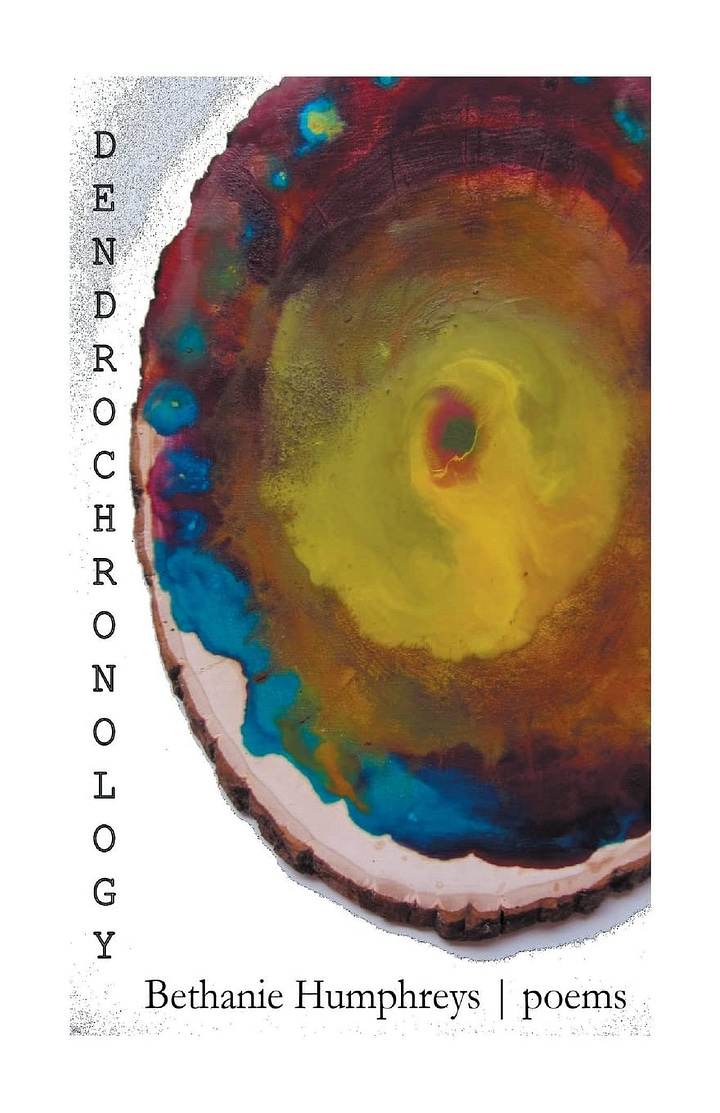
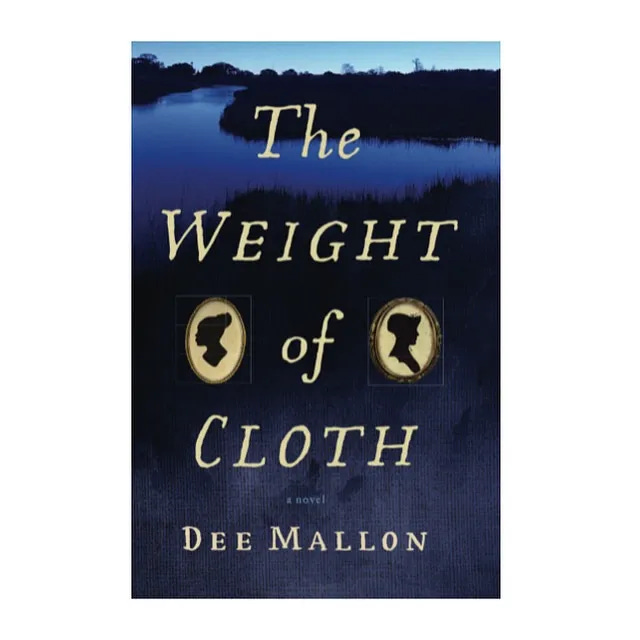
Our Pub Club’s final meeting in November will include a celebratory reading by Dee Mallon, a fiber artist who recently self-published her debut novel, The Weight of Cloth. After learning about Eliza Lucas Pinckney in a book about eco-dyeing, she started writing scenes set in South Carolina in the 1740s. After more than 12 years of research and writing and three trips to Charleston, she completed it:
“In spite of slavery’s relentless degradations, the story speaks to the power of resistance and love and highlights both small and large acts of courage.”
Most of the chapters originated in the AWA writing circle of Kathleen Olesky, who co-facilitated our AWA workshop leader certification with Maureen Buchanan Jones in June 2019. I can still recall how deeply Dee’s writing resonated with me when she read aloud from whatever she’d just generated from prompts during our training. Bravo!
woodswoman in the city
If I’d received the Anne LaBastille Memorial Writers Residency, I’d be spending two weeks now (Sept. 22–Oct. 6) in the heart of the Adirondack mountains—“with indoor and outdoor writing spaces, fireside hangouts, paddling, hiking, forest bathing, and family-style meals at a spacious lakeside lodge.” There’s only one slot for a nonfiction writer residing outside the region, so it was unlikely. But I loved getting reacquainted with Anne LaBastille, who wrote books from her cabin on Twitchell Lake, including Woodswoman: Living Alone in the Adirondack Wilderness, which I first read in my thirties.
Instead, Kristen and I are heading next week to NYC, Vermont, and the Berkshires for two weeks of leaf peeping (including a fall foliage river cruise on the Hudson and a migratory birding excursion in Central Park). I pitched an article for Viator (where I freelance edit) about visiting Ellis Island (on Yom Kippur, the day before what would be the 102nd birthday of my great-aunt Ruthie, my paternal grandfather’s youngest sibling of 11). Later we’ll take a Jewish apartment tour at the Tenement Museum.
Their mother Dora and three eldest siblings—Rosa (Rose), 9; Reisie (Bessie) 7; and Mindel (Minnie), 5—arrived at Ellis Island on Dec. 13, 1905 from Stryi (western Ukraine, then under Austrian rule) via Antwerp. All three girls were born in Zambrow (then under Russian rule). In 1895, the year Dora and my great-grandfather Chaim (Hyman) were married (a year before Rose was born), a fire broke out that burned down Zambrow’s entire Jewish settlement, including 400 wooden houses with straw roofs, 100 stores, and the synagogue, leaving 2000 people without shelter. It’s chilling to consider their possible fate if they hadn’t emigrated: 20,000 were deported to Auschwitz in 1942–43, with only a few survivors after the war. Tragically, Dora took her own life when my Grandpa was just sixteen. Their father abandoned them so he finished high school to help support his siblings during the Great Depression.
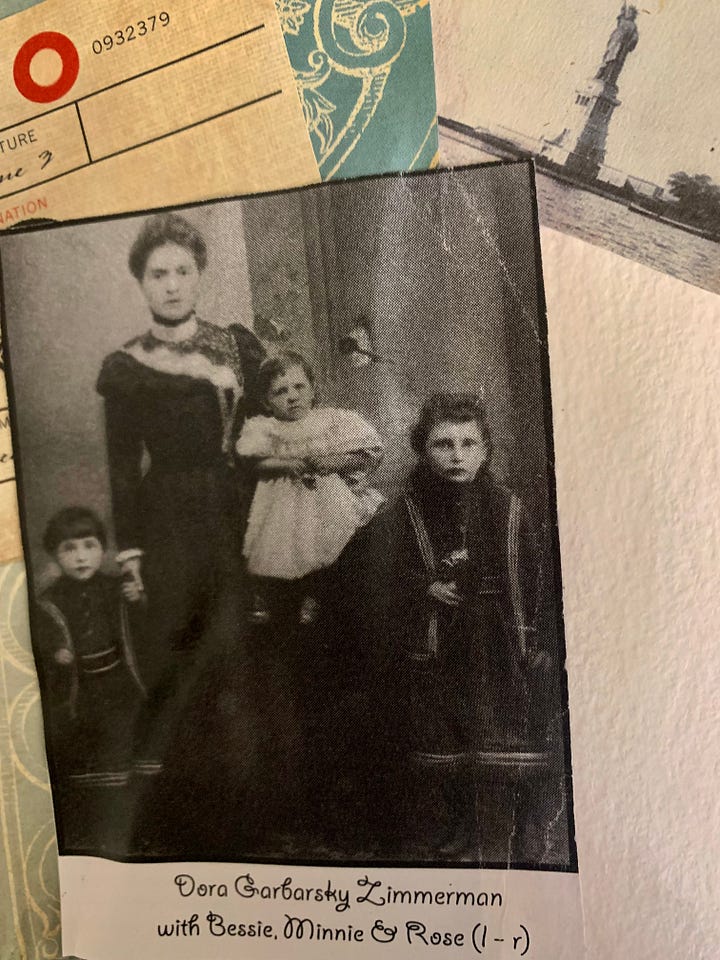
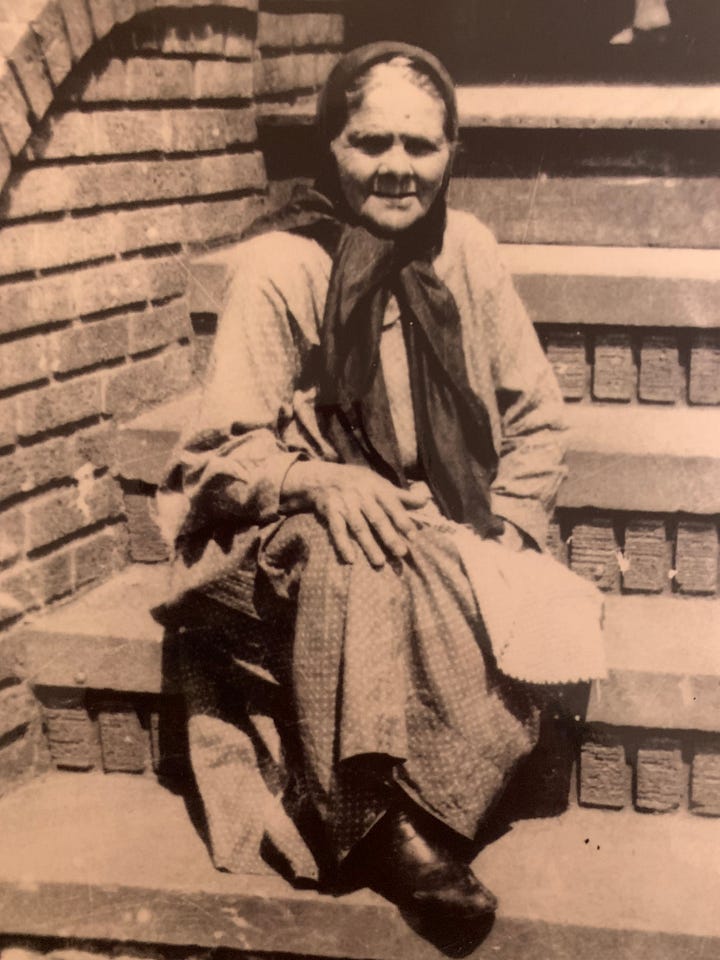
dreamed memory
I recently read three heart-wrenching books: a memoir, an autobiographical novel, and an “imagined” memoir. Molly, by Blake Butler, retrospectively investigates tensions with his deeply troubled partner, the late poet Molly Brodak, who shot herself nearly three years into their marriage. Like this NYT reviewer stated, “My feelings about this book are mixed.” But many reflections resonated.
September is National Suicide Prevention Month. As anyone affected by someone who has contemplated, attempted, or died by suicide understands:
“Molly tried to tell herself that she and the world both might be better off if she were gone, but suicide doesn’t decrease pain and suffering, as I have felt it—it passes it on, translates its trauma into the experience of others manyfold… ” – Blake Butler, 2023
It struck me that Brodak was only 39 when she took her own life, the same age as Irène Némirovsky, a French novelist of Ukrainian-Jewish origin who completed two-fifths of Suite Française just before her 1942 deportation and death in Auschwitz. Her young daughters, ages five and twelve, were hidden away and survived the Holocaust.
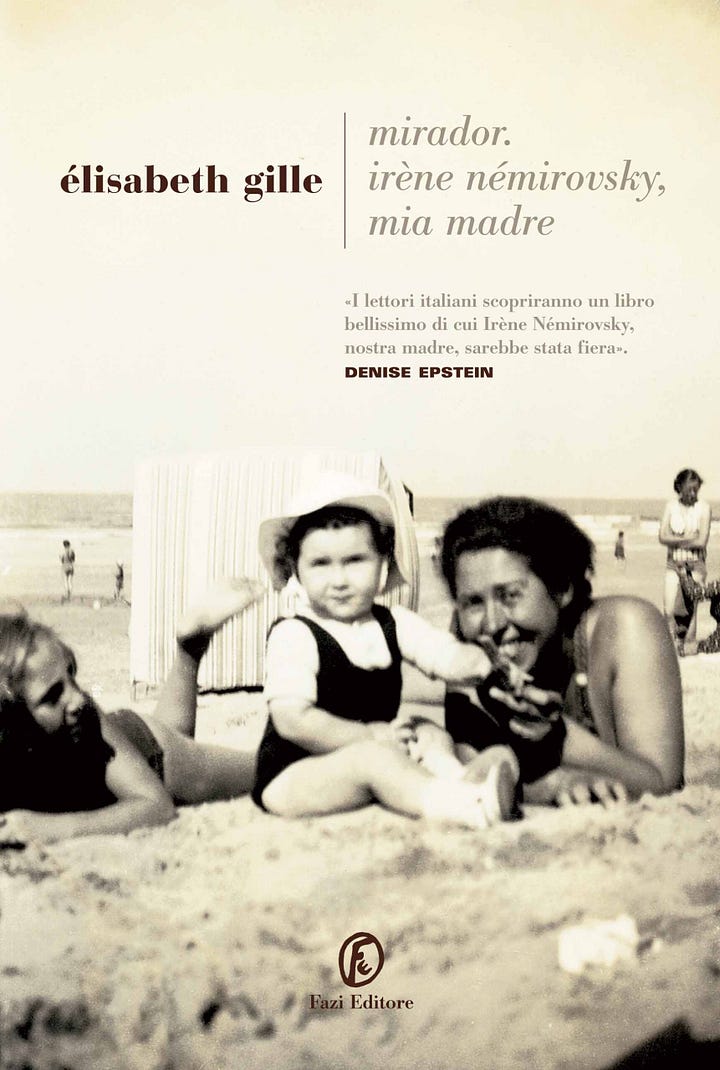

My favorite book of the three is The Mirador by Élisabeth Gille, who in her late fifties wrote her speculative memoir—told from her mother’s point of view (based on her letters, novels, and extensive notes)—subtitled Dreamed Memories of Irène Némirovsky by Her Daughter. It was published soon before Gille died of cancer at 59.
Strewn between chapters are italicized, interstitial texts, each one written of herself as “child” in past-tense third-person POV, a style that sounds most dreamlike of all, including the final page, dated October 1991, which poignantly begins:
“The child ceased being a child many years ago. At her age, she could almost be the mother of her mother, who will remain thirty-nine for all eternity.” – Élisabeth Gille, 2000
loss for words
As an American Jew I am brokenhearted over the ongoing bloodshed in the Middle East, but I’ve struggled to articulate a stance (except in my private writing). I appreciate and stand by this statement drafted by my synagogue, Congregation Ner Shalom (a progressive and inclusive Jewish community led by Rabbi Irwin Keller), “in response to our deep and abiding pain over the unfolding of events in Israel and Gaza”:
“The death toll in Gaza has not brought back the hostages, but it has caused unspeakable suffering, undermined Israel’s moral standing, and wounded the collective Jewish soul … We believe there is no military goal that merits starving a civilian population. We cannot bear such actions to be carried out in our name or in the name of Jewish survival.”
To learn more about the historical complexity of this ongoing conflict and its impact, I turn to the power of story. I’ve read and listened to a variety of (often polarized) perspectives—from Raja Shehadeh, a Palestinian lawyer and author in the West Bank who wrote about “the uprooting of life” in an October 2023 issue of The New Yorker, to Sol Stern’s 2010 City Journal article challenging the Nakba narrative, to prose and poetry in Against Silence: A Palestinian Writing Series in Words Without Borders, such as “Remembering Dr. Refaat Alareer,” an homage to the Palestinian poet and mentor/professor who was killed by an Israeli airstrike last December.
In her Rabbi’s Notes, Margaret Holub (Mendocino Coast Jewish Community) addresses our communal distress and contemplates the merits of prayer:
When we pray for peace at a service, I almost always invite people to locate one fractured place in our world that they would like to lift up in prayer and to hold it in their hearts as we pray. I like to imagine that over… years of quiet prayer, the globe will be sprinkled with our peace prayers. Some may be praying for the bereaved families of Israeli hostages. Others may be praying for Palestinians fleeing Rafah. Others may be praying for Haiti or Sudan. Or siblings or neighbors. This is a different kind of “statement,” lifted up by each of us to the heavens.
I’ve been an atheist since before my Bat Mitzvah, yet I often find solace in the poetry of prayer, which I’ll read, chant, and sing this week alongside my father during Rosh Hashanah (Jewish new year) services we attend annually at his synagogue.
Od yavo shalom aleynu
V’al kulam!
Salaam, aleynu v’al kol ha-olam
Salaam — Shalom
Peace will yet come for us and for everyone,
for us and for the whole world.








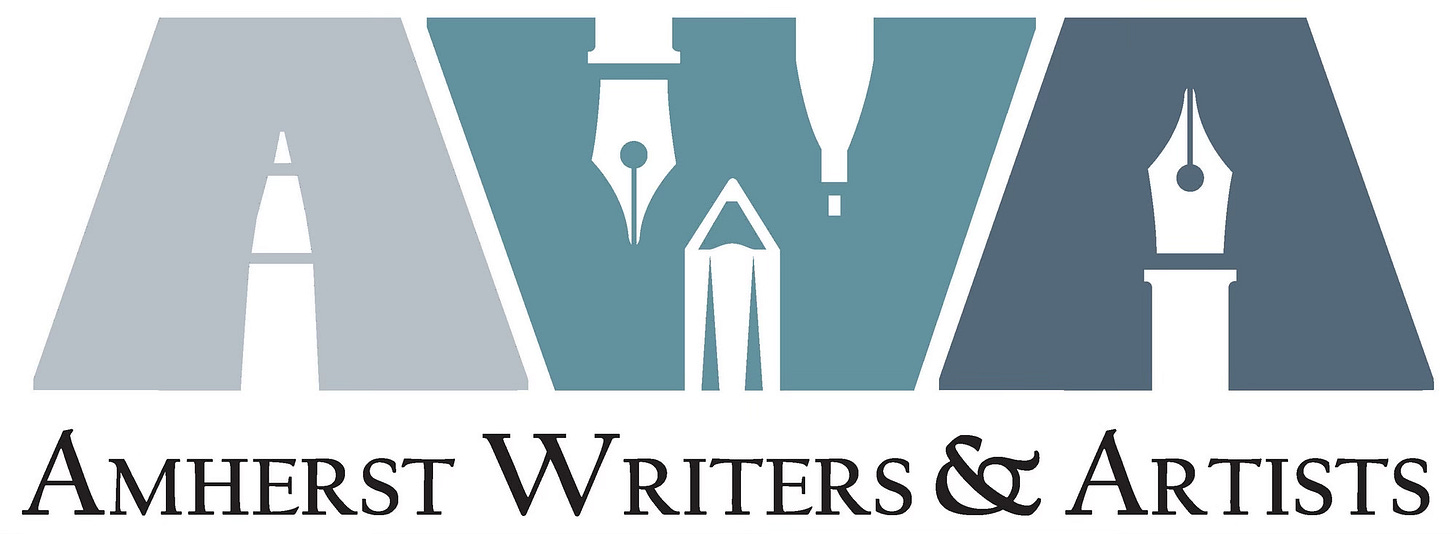
Stunningly beautiful, Nicole. Well done. Your newsletter has depth, breadth, and scope. It is so well written. BTW, I'm familiar with those CRAFT rejections. I submitted to both calls.
I look forward to an opening in my life's schedule when I may reenter your always inspirational workshop/s!